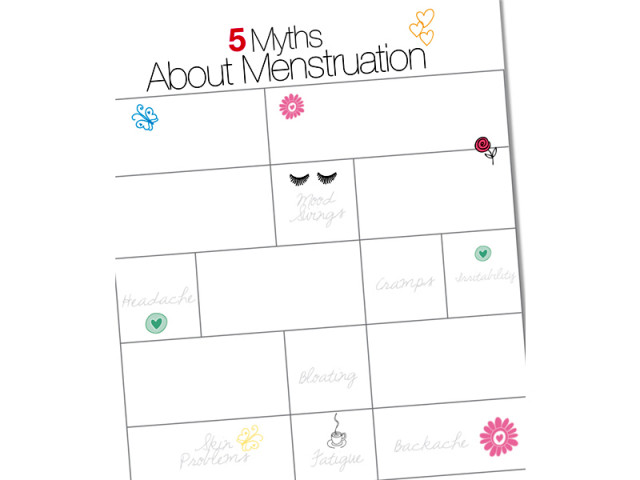5 myths about menstruation
Busting misconceptions about that special time of the month.

5 myths about menstruation
1- Menstruation cycles are the same for everyone:
According to gynaecologist Dr Shamim Jafri, “Many women are of the view that one menstruation cycle is always of an exact seven days for everyone.” In reality, however, the duration of a cycle varies from person to person, depending on the health of the girl. “One cycle may last just three days for someone and eight for another, it doesn’t matter,” explains Jafri. Many women also experience irregular cycles with no set monthly dates either. Nonetheless, it is advisable for mothers to take their daughters for a general check-up following their first menses to ascertain that all is well.
2- Exercise disrupts menstruation:
Unless one is a heart patient or suffers from any other medical condition that could worsen due to exercise, there is absolutely no reason why they should discontinue their exercise regime during that time of the month. In fact, exercise has been proven to regulate menstruation and help soothe the symptoms of pre-menstrual syndrome (PMS) such as cramps and fatigue. Jafri recommends exercise to those who suffer from muscular pain to relieve the tension, provided that it is toned down a bit. “You can do any kind of exercise you like, even hand-stands, so long as it isn’t extreme.” Extreme exercise or physical activity can deregulate one’s period and lead to fertility problems in the long run, as experienced by many female athletes and fitness enthusiasts.
3- One shouldn’t eat certain foods during that time of the month:
During menstruation, many women experience low energy levels and the hormonal changes give rise to cravings for certain foods, especially carbohydrates. Unfortunately, there is a long list of food items we are told to avoid while on our period, such as fish or other greasy meat. However, there is little or no medical evidence which supports this assertion. Jafri clarifies that, “Food is digested in the stomach which has no link to menstruation as such.” Of course, this does not mean women have a free card to consume unhealthy food products as it is always better to eat healthy. The aim should be to consume the right amount of proteins and carbs to maintain sugar levels and keep you going through the week.
4- Bathing can halt your period:
The idea that water temperatures can affect menses adversely is prevalent throughout Pakistan. Many women avoid bathing – or at least, washing their hair – during their cycle for the fear that their period may slow down or stop completely. “Once again, there is no medical evidence to support this idea whatsoever,” says Jafri. “In fact, I would recommend women to bathe as per normal during menses because hygiene is of utmost importance then. Lack of hygiene can lead to other related issues, such a rashes or bad odour.”
5- Pre-menstrual syndrome (PMS) is a myth:
According to a study published in the American Family Physician Journal 2003, PMS is a “Common cyclic disorder in young and middle-aged women characterised by emotional and physical symptoms during the luteal phase of the menstrual cycle.” The disorder manifests itself in a variety of physical and mental symptoms, such as depression, mood swings and abdominal pains, headaches and fatigue. According to Jafri, “The symptoms arise due to the constriction of blood vessels in the pelvic region,” and the physical pain only furthers the emotional volatility. Women can adopt small lifestyle changes to help alleviate their symptoms, such as exercising and eating healthy.
Published in The Express Tribune, Ms T, July 20th, 2014.



















COMMENTS
Comments are moderated and generally will be posted if they are on-topic and not abusive.
For more information, please see our Comments FAQ